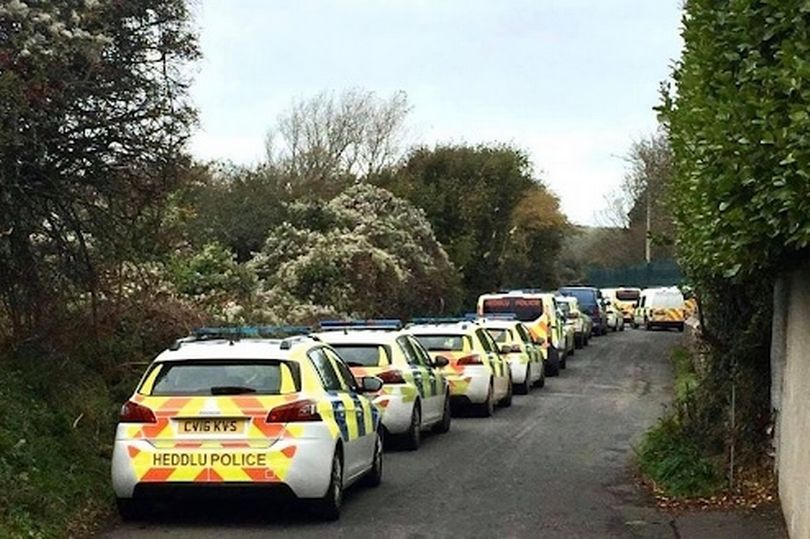News
Demands for police to be reimbursed for Penally

· A million pounds spent on policing to December
· Protests for and against cost police £685,000
· Crime panel: “Government must fully reimburse Dyfed-Powys Police for all costs”
· Home Office: “We have already agreed to provide £2.5million”
POLICING Penally camp has cost more than a million pounds and taken up more than 8,000 policing hours in the first six weeks after it was opened.
Housing asylum seekers in Pembrokeshire have placed a “significant financial burden” on Dyfed-Powys Police, the force’s Police and Crime Panel have said.
Between September 25 and November 11, more than 1,000 officers were called to attend the asylum camp in the village of Penally on the outskirts of Tenby.
ONE MILLION SPENT
At the panel, chairman Alun Lloyd-Jones said policing the Penally camp involved 13,919 hours of officer time, including 9,681 overtime at a cost of £297,000, up to the end of December.
The total costs of policing protests at the camp were £685,000, the panel said, totalling just short of a million pounds at £982,000.
Obviously, with costs this year well over a million pounds has been spent – mostly in overtime payments.
The panel is calling on the UK Government department to reimburse the force for the additional costs.
Police and Crime Commissioner for Dyfed-Powys Police Dafydd Llywelyn said he wanted additional funding from the Home Office to support local resources that have been put under pressure as a result of the decision to utilise the camp as an asylum centre.
Last month there were two protests by the asylum seekers themselves in Tenby over conditions. Mr Llywelyn said: “I’m aware that police were in attendance during protests that have taken place this week, and I was pleased to hear that the protests were peaceful with no disorder reported.
“These are extremely difficult times for all of us. I have seen first-hand the difficult circumstances encountered by individuals that are residing at the centre and I have met with the Chief Inspector of Asylum and Immigration who gave me assurances about an independent inspection that will take place in the near future.
“However, now is not the time to be gathering to hold protests, and I can understand the frustrations of the local communities when observing such activities.
“Officers will and have been acting accordingly when Covid-19 regulations are breached, and I’m reassured that the Force have been liaising with the site management team to educate them of the Force’s four E principles’ approach – engage, explain, encourage and enforce.
“In the meantime, we remain in regular contact with local partners and service providers, monitoring all situations around the facility,”
The Penally training camp began to house up to 250 asylum seekers in September, including men from Iraq, Iran and Syria.
As the Herald has extensively covered, it has attracted multiple protests – some by far-right groups and some by concerned locals.
There have also been other protests in support of the asylum seekers, and some from asylum seekers themselves protesting against the conditions in the camp.
SPECIAL FUNDING INSUFFICIENT
The panel states that under Home Office police funding rules special grants can be given to cover additional pressures, but only if the total cost of these pressures exceeds 1% of the force’s net revenue expenditure for the year.
According to the Dyfed Powys Police and Crime Panel, this would mean it would not be able to claim any additional grants from the Home Office to cover costs unless extra costs exceeded £1.129 million.
The panel said it is calling on Home Secretary Priti Patel, Policing Minister Kit Malthouse and MPs in the area – including the Welsh Secretary Simon Hart – to encourage the UK Government to fully reimburse Dyfed-Powys Police for all costs incurred in policing Penally camp – even if the costs are below this Home Office threshold.
The UK’s Independent Chief Inspector of Borders and Immigration has begun an inspection of the use of hotels and army barracks as temporary accommodation for asylum seekers and is calling for evidence.
The Home Office spokesman told The Herald that it had agreed extra funding and said: “We have already agreed to provide £2.5million of Special Grant funding to Dyfed-Powys Police in relation to these costs up to September 2021.”
Dyfed Powys Police said it had a number of officers dedicated specifically to the Penally Camp to undertake regular patrols both inside the camp, around the village and to respond to calls for the camp.
These duties took up 8,264 hours of police time in the six-week period, not counting officers who have responded to incidents on occasions where the officers undertaking the Penally camp duties have not been working.
Although these officers would have been working anyway and are therefore not an “additional” cost, it does not take into account any overtime to help replace the reallocated officers.
HIGH NUMBER OF ARRESTS
A number of arrests were made in that same period as protesters gathered outside the camp during September and October calling for the camp to be closed.
In total, 13 arrests were made for offences. These included: racially aggravated Section 4 public order offences; obstructing and/or resisting a constable in execution of duty; racially or religiously aggravated intentional harassment/alarm/ distress; arson; use of threatening abusive or insulting words or behaviour with intent or likely to stir up racial hatred, affray; and actual bodily harm.
The force would not divulge how many of those arrests involved protesters and how many were men living inside the camp.
The operational demands were originally thought to be in the region of £3 million but have since been projected to cost Dyfed-Powys Police in the region of £1.2m as lockdown has forced protesters away.
In a report at a recent finance meeting Dafydd Llywelyn, the police and crime commissioner, wrote that he had estimated operational costs for policing the camp to be around £1.2m for the year.
Charity
Vincent Davies raises £13,682 for air ambulance charity

Independent Haverfordwest store backs lifesaving crews with year of community fundraising
A WEST WALES department store has raised more than thirteen thousand pounds for a lifesaving emergency service after a packed year of community fundraising.
Staff at Vincent Davies Department Store collected £13,682 for the Wales Air Ambulance Charity, after voting the organisation their Charity of the Year for 2025.
The independent retailer organised events throughout the year, including an Easter bingo, bake sales, quizzes, raffles, staff sales, Christmas jumper days and a festive wreath-making workshop. Charity jam jars placed in Café Vincent also helped gather steady donations from customers.
One of the most popular attractions was the store’s charity singing penguin trio, which drew smiles from shoppers of all ages and boosted collections.
Sarah John, Joint Managing Director at Vincent Davies, said: “Raising £13,682 for the Wales Air Ambulance Charity is something we are extremely proud of at Vincent Davies Department Store. As a director, it’s wonderful to see our community come together to support a charity that makes such a lifesaving difference.”
The air ambulance is consultant-led, delivering hospital-level treatment directly at the scene of serious incidents and, when needed, transferring patients straight to the most appropriate specialist hospital.
Working in partnership with the NHS through the Emergency Medical Retrieval and Transfer Service, crews can provide advanced critical care including anaesthesia, blood transfusions and even minor surgical procedures before reaching hospital.
Operating across the whole of Wales, its teams travel the length and breadth of the country by helicopter and rapid response vehicle to reach patients quickly in both rural and urban areas.
This is not the first time the Haverfordwest store has backed the cause. In 2016, staff previously raised £5,831 when the charity was also chosen as their beneficiary.
Mike May, the charity’s West Wales Regional Fundraising Manager, said: “We are so grateful to Vincent Davies Department Store for raising an incredible amount for our charity. Throughout the year they put on a variety of different events and what a successful fundraising year it was.
“The charity needs to raise £13 million every year to keep our helicopters in the air and our rapid response vehicles on the road. By raising £13,682, the staff and customers have played an important part in saving lives across Wales.”
The store says it will announce its Charity of the Year for 2026 in the coming weeks.
Crime
Police assess complaints over Mandelson–Epstein links

Met says allegations will be reviewed to see if criminal threshold is met following release of US court files
SCOTLAND YARD is reviewing a series of complaints alleging possible misconduct in public office after fresh claims emerged linking former UK ambassador Peter Mandelson to convicted sex offender Jeffrey Epstein.
The Metropolitan Police Service confirmed it has received “a number of reports” following the publication of millions of pages of material by the United States Department of Justice, and will now decide whether any alleged conduct reaches the level required for a criminal investigation.
Commander Ella Marriott said the force would assess each report individually, stressing that a review does not automatically lead to formal proceedings.
The documents, widely referred to as the “Epstein files”, appear to show Mandelson corresponding with Epstein while serving as business secretary during the government of Gordon Brown at the height of the global financial crisis.
According to reports, Epstein was allegedly given insight into internal policy discussions, including proposals around banker bonus taxes in 2009 and details of a eurozone bailout package shortly before it was announced publicly.
Payments questioned
Bank records cited in the US disclosure reportedly show payments totalling 75,000 US dollars made to Mandelson between 2003 and 2004. It is also claimed Epstein paid for an osteopathy course for Mandelson’s husband.
Mandelson has denied any wrongdoing and said he has “no record or recollection” of the alleged transfers.
On Sunday he resigned his membership of the Labour Party, saying he did not want his continued association to cause further difficulty for the party.
In interviews, he dismissed suggestions that Epstein influenced his decisions as a minister and said nothing in the released files pointed to criminality or misconduct on his part.
Pressure mounts
The political fallout has intensified, with Downing Street confirming Keir Starmer has asked Cabinet Secretary Chris Wormald to carry out an urgent review into Mandelson’s historic contacts with Epstein while in office.
Brown has also called for an examination of whether any confidential or market-sensitive information was improperly shared during the financial crisis.
The case is the latest in a series of controversies linked to Epstein’s long-standing relationships with powerful figures on both sides of the Atlantic.
Police emphasised that no charges have been brought and that Mandelson is not currently under criminal investigation, but said the complaints process would be handled “thoroughly and impartially”.
Community
Councillor meets chief constable to address Monkton and Pembroke concerns

COUNTY COUNCILLOR Jonathan Grimes has met with the new Chief Constable of Dyfed-Powys Police to discuss crime, antisocial behaviour and wider community issues affecting residents in Pembroke and Monkton.
Cllr Grimes, who represents Pembroke St Mary South and Monkton, said the meeting followed his invitation for senior police leaders to visit the area and hear first-hand about local concerns.
The Chief Constable, Ifan Charles, attended alongside officers from the Pembroke Neighbourhood Policing and Protection Team, meeting the councillor in Monkton for what were described as open and constructive talks.
As part of the visit, they also spoke with Monkton Priory Community Primary School headteacher Dylan Lawrence and Danny Nash from Pembrokeshire County Council Housing Services to gather views from education and housing professionals.
Discussions covered a range of issues raised by residents, including domestic abuse, drug and alcohol misuse, antisocial behaviour and environmental concerns such as littering, dog fouling and dangerous or inconsiderate driving.
Cllr Grimes acknowledged recent police successes, particularly in tackling drug-related activity, but said enforcement alone would not solve the area’s challenges.
He said closer cooperation between the police, council services, schools and the wider community would be needed to deliver longer-term improvements.
The councillor added that he plans to encourage residents to form a local community group in the coming weeks, aimed at developing practical solutions and strengthening partnership working across the area.
-

 Health4 days ago
Health4 days agoConsultation reveals lack of public trust in health board
-

 News6 days ago
News6 days agoCaldey still unsafe, survivors warn — despite Abbey’s reform claims
-

 Community5 days ago
Community5 days agoPembrokeshire students speak at national Holocaust Memorial Day event
-

 News6 days ago
News6 days agoKurtz raises Gumfreston flooding in the Senedd as petition deadline nears
-

 Community7 days ago
Community7 days agoStorm Chandra: Morning impacts across Pembrokeshire
-

 Entertainment7 days ago
Entertainment7 days agoRapunzel brings festive magic to Torch Theatre
-

 Crime6 days ago
Crime6 days agoMan denies murdering brother as jury hears of ‘ferocious attack’ at Morriston flat
-

 Education5 days ago
Education5 days ago‘Vulnerable teen’ questioned by police at Milford Haven School

































